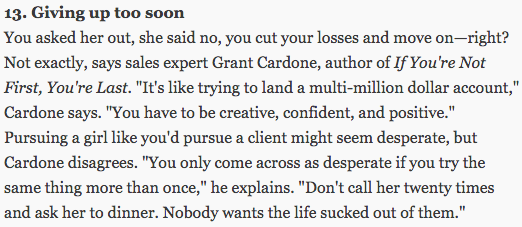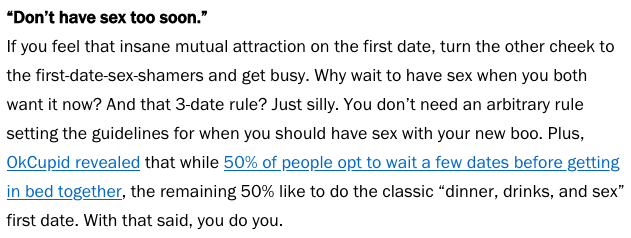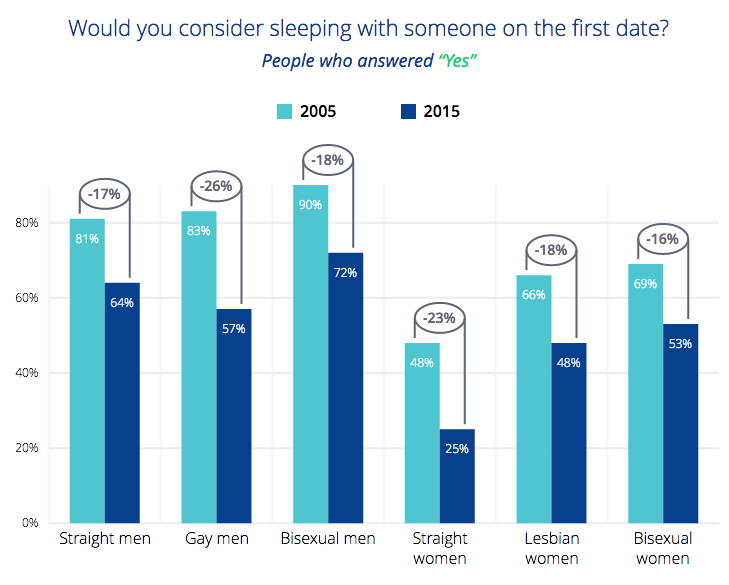The One Piece of Dating Advice That Has to End

By:
When it comes to dating advice, veer away from tips that reek of entitlement. That seems simple and self-evident enough, yet time and again we see men's magazines publishing advice columns that emphasize the importance of dogged persistence in dating.
Here are a few examples, for context.
 Stocksy/Evgenij Yulkin - stocksy.com
Stocksy/Evgenij Yulkin - stocksy.com
1. Men's Fitness, "How To Turn a 'No' Into a 'Yes'"
2. Men's Health, "15 Dating Mistakes You're Probably Making"
 Men's Health - menshealth.com
Men's Health - menshealth.com
3. Maxim, "5 Pieces of Relationship Advice you Hear Often, But Should Never Listen To"
 Maxim - maxim.com
Maxim - maxim.com
Author's commentary: The way this OkCupid survey is depicted is misleading. It makes it seem like men and women are equally divided when it comes to the idea of having sex after the first date. In reality, the survey found that women (particularly straight women) are significantly less inclined to sleep with someone on the first date than men.
 OkCupid - okcupid.com
OkCupid - okcupid.com
4. Authentic Man Within, "The Art of Being Persistent When Approaching Women"
 AuthenticManWithin - authenticmanwithin.com
AuthenticManWithin - authenticmanwithin.com
5. Elite Man Magazine, "Persistence With Women"
 Elite Man Magazine - elitemanmagazine.com
Elite Man Magazine - elitemanmagazine.com
The common threads that run through these dating tips is a slow recognition that persistence can be annoying to women and a presumption that the appearance of male entitlement can be strategically avoided. The Men's Fitness article represents an overt example of this problem, but the advice — which appears to reject the fact that "no" always means "no" — exists subtly in advice columns across the web.
There's a fine line between persistence and harassment.
If you're attempting to woo someone and they say "no," your instinct probably shouldn't be that this person is wrong, confused, or too shy. But the other problem with advice emphasizing persistence is that it lacks context and utility. Every dating situation is different — every person has their own courting preferences — and so it's impossible to apply on a universal scale.
Here's how one Marie Claire writer described the feeling of unwanted persistence in dating:
"I have to wonder if men who pursue in a situation like that aren't psychologically screwed up — suffering from low self-esteem, and hoping to "win over" high-caliber women in an effort to boost their egos or have some kind of external affirmation of their worth. Their insecurity often seems to have a touch of masochism in it, so that they chase women mainly for the challenge of winning them over, only to ditch them as soon as they reach a certain (often sexual) goal, like the man who texted my friend's friend to say he didn't want to see her again after screwing her on Date No. 7. I have to wonder if these men don't actually see themselves as powerless in the world in a way that helps to subconsciously justify their behavior."
Here's the caveat. As plenty of men and women would tell you, some people do respond to persistence. Plenty of relationships have been forged after an initial rejection; I can personally attest to this. But because you can't control how people will interpret and act on this common advice, it's potentially very bad advice. It reinforces a concept that society has been working hard to abandon — that men are entitled to women and "no" is subjective.
